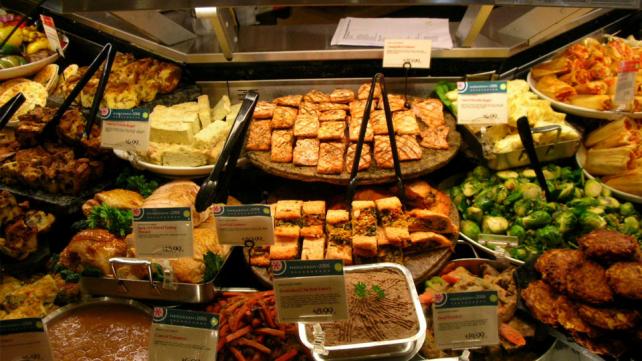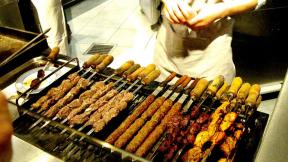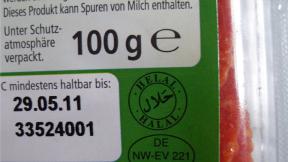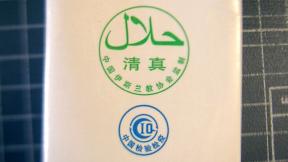
Often times Muslim consumers tend to assume 'Kosher' is similar to 'Halal'. Although the slaughtering rituals of Jewish people resemble those of Muslims; kosher and halal are two different entities carrying a different meaning and spirit. Muslims, therefore, are provided with the following basic information about Kosher so they can exercise care in distinguishing halal from kosher.
Kashrut (in Hebrew) is the system of Jewish dietary laws. Kosher (kashur in Hebrew) means 'fit, or proper for use' according to Jewish law. Examples of kosher are: the meat of the 'fore quarter*' of the cattle slaughtered ritually, fruits, vegetables, all fish that have fins*, Kosher wines*, Kosher cheeses*, Kosher gelatin*.
The opposite of Kosher, as applied to food in Treif (in Yiddish), or trefah (in Hebrew) meaning 'not suitable for use', or 'forbidden'. Trefah literally means 'torn by a wild beast' (Exodus 22:30). Examples of Trefah are: blood, swine, rabbit*, all shell fish*, wild birds such as wild hen*, wild duck*, and the birds of prey.
(*) These food items exhibit a marked difference between kosher and Halal as well as trefah and haram. The differences are explained elsewhere in this section.
Caution to Muslim Consumers:
Halal is a comprehensive Islamic term encompassing not only the matters of food and drink, but all other matters of daily life. Islam being the final and perfect way of life for humanity, it supersedes all the previously revealed religions including Christianity and Judaism. The rituals in all matters were perfected by God (al-Quran 5:3)
According to Islamic Jurisprudence, no one except God can change forbidden (Haram) things into lawful (halal) for vice-versa. It is forbidden for people to change the lawful (Halal) things into unlawful (Haram), or vice-versa.
Halal is a unique Islamic concept and eating zabiha (Islamically slaughtered) meat is a distinguishing part of a Muslim's identity as expressed by Prophet Muhammad, peace and blessings be upon him.
Salient differences between kosher and halal are:
Islam prohibits all intoxicating alcohols, liquors, wines and drugs. kashrut regards their wines kosher. Hence food items and drinks showing the kosher symbol containing alcohol are not halal.
Gelatin is considered Kosher by many Jews regardless of its source of origin. If the gelatin is prepared from non-zabiha, Muslims consider it haram (prohibited). Hence foods items such as marshmallows, yogurt, etc., showing kosher symbols are not always halal.
Enzymes (irrespective of their sources even from non-kosher animals) in cheese making are considered mere secretion (pirsah b'almah) according to some kashrut organizations, hence all cheeses are considered kosher by many Jews. Muslims look for the source of the enzyme in cheese making. If it is coming from the swine, it is considered haram(forbidden). Hence cheeses showing kosher symbols may not be halal.
Jews do not pronounce the name of God on each animal while slaughtering. They feel that uttering the name of God, out of context, is wasteful. Muslims on the other hand pronounce the name of Allah on all animals while slaughtering.
The salient differences between kosher and halal have been illustrated so that Muslim consumers can distinguish halal from kosher.
Muslims in non-Muslim countries should strive to follow the Islamic injunctions in their diet (as well as in every walk of life) and establish their own businesses and institutions to cater to the needs of the Muslim Ummah. By doing so, not only the identity of the Muslims will be preserved, but they will be recognized and respected for their beliefs and practices.
Differences within Kosher:
There are different sects within Judaism and there are several hundred Jewish Kosher authorities in the US who certify Kosher based on extremely liberal to extremely conservative rules. Therefore it is difficult to come up with one uniform opinion regarding Kosher practices. A symbols "k" for kosher is not governed by any authority. Any manufacturer can use it at will. A website guiding Jews about Kosher states "it may take a great deal of detective work to ascertain the standard that a particular rabbi is using." For this reason many Muslims when buying anything kosher look for "u" in a circle which are more conservative Kosher symbol.
"Hanukkah dishes" by Ms Jones from California, USA - Happy Hanukkah!. Licensed under Creative Commons Attribution 2.0 via Wikimedia Commons - http://commons.wikimedia.org/wiki/File:Hanukkah_dishes.jpg#mediaviewer/File:Hanukkah_dishes.jpg








Comments
Marshmallos and gelatine can made of anything. I've had seaweed gelatine. It's hard to find good kosher cheese because of the enzyme issue...so i believe you enzyme comment is incorrect. Furthermore, jews do say a bracha or prayer before they slaughter. I have some muslim friends that do eat kosher and other get very mad at them!
Location
GELATIN IS A PORK PRODUCT, SO ARE MARSHMALLOWS
Location
I fail or drink completely to understand how the eating or not eating of any kind of food can be a contribution to a fair relationship to a God.I consider that a human and respectful behaviour between human beings is more important than frankly silly food prescriptions.People who refuse to eat what I serve them with care and friendship are not welcome to my home. Let them stay in their narrow-minded dwellings.
Location
This is really interesting and I thank you! We are about to have a Muslim friend over for the Shabbat (Jewish Sabbath) dinner and I wanted to see what she might be able to eat in our kosher home. I noticed that you mention all wine is kosher but this is not so - it must have the marking (hechsher) - perhaps that was what you meant but i didnt understand it that way. Thank you again!
Location
sure saved my birthday bbq since i had several muslim friends coming over, so i was able to look for the appropriate meats at the supermarket.
Location
Thanks for the clarification. Hope this will help many muslim brothers and sisters in deciding between eating Kosher marked food or (U) marked food.
Location
I found this discussion very helpful on a point that I was curious about, and I'm very hopeful that everyone reading this thread will marvel on what these traditions have in common ... rather than the subtleties that differ: the common understanding that our consumption of animal flesh is not the neutral act of harvesting vegetables, and requires that we focus on the Source of our sustanenance and our act of butchering.
Location
another note: i don't believe Islam prohibits the consumption of meat & milk together, which is prohibited by Jewish law, and further enlightnement on this would be welcome. With respect to cheese, the opinion of whether rennet is to be regarded as "meat" let alon from a kosher & kosher slaughered animal is the subject of substantial discussion.it is interesting to note that some cheese, such as Pitta brand halloumi, specifically list vegetable rennet as an ingredient, even though there is not a specific kosher sign on their USA product. this is helpful to lacto-vegetarians.peace & understanding to all who visit this page.
Location
this was an education in halal for me. increasing understanding between peoples is a good thing.previous commentary has well outlined the inaccuracies re: kosher. Mark, of Durham NC, summed it up nicely & succinctly. especially where meat, cheese, & gelatine are concerned, a reliable "hechsher" (certification) is required by most jews who identify themselves as keeping kosher. for instance, i only buy marshmallow from israel made with fish gelatine.
Location
Assalaamualaikum, JazakumAllahu Khair for the article. I was wondering about the "k-geletin' and Alhumdulillah I found my answer. Thank you to all the Non-Muslim brothers and sisters who added their informative comments as well. It helped a lot. May the One most high guide and reward you all. Ameen.
Location
Pages
Add new comment